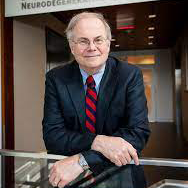
Gregory A. Petsko
Board of Governors
Professor of Neurology, Weill Cornell Medicine, New York City Tauber Professor of Biochemistry and Chemistry, Emeritus, Brandeis University, Waltham, Massachusetts
Gregory A. Petsko is the Arthur J. Mahon Professor of Neurology and Neuroscience and Director of the Helen and Robert Appel Alzheimer’s Disease Research Institute at Weill Cornell Medical College in New York City, and Professor of Biomedical Engineering at Cornell University. He received his BA from Princeton University, summa cum laude, in 1970, and his D. Phil. from Oxford University (which he attended as a Rhodes Scholar) in Molecular Biophysics in 1973. He was Professor of Chemistry at MIT from 1978 until 1990, when he moved to Brandeis University, where he was Director of the Rosenstiel Basic Medical Sciences Research Center and Chair of the Department of Biochemistry. He took up his present position in April of 2012, upon the appointment of his wife, Dr. Laurie Glimcher, as Dean of Weill Cornell Medical College. His awards include the Siddhu Award of the American Crystallographic Association, the Pfizer Award in Enzyme Chemistry of the American Chemical Society (for his development of methods to visualize reaction intermediates in three dimensions at atomic resolution), the Lynen Medal for contributions to the study of protein dynamics, and in 1991 the Max Planck Prize, which he shared with Professor Roger Goody of Heidelberg for their joint work on the molecular origins of some human cancers. He has been elected to the National Academy of Sciences, the Institute of Medicine, the American Academy of Arts and Sciences, and the American Philosophical Society. He has an honorary Doctor of Laws from Dalhousie University. He is immediate Past-President of the American Society for Biochemistry and Molecular Biology and is President of the International Union of Biochemistry and Molecular Biology. He is the founder of several biotechnology companies and one of the founding editors of the PLoS family of journals. His research interests include protein structure and function and the development of methods to treat age-related neurodegenerative diseases, including Lou Gehrig’s, Alzheimer’s and Parkinson’s diseases. His public lectures on the aging population and its implications for human health have attracted a wide audience on the Internet (his TED talk, for example, has been downloaded over 600,000 times). For the past twelve years he has also written a widely-read column on science and society, the first ten years of which are available in book form. He admits, however, that the columns guest-written by his two dogs, Mink and Clifford, are much more popular than those he writes himself.